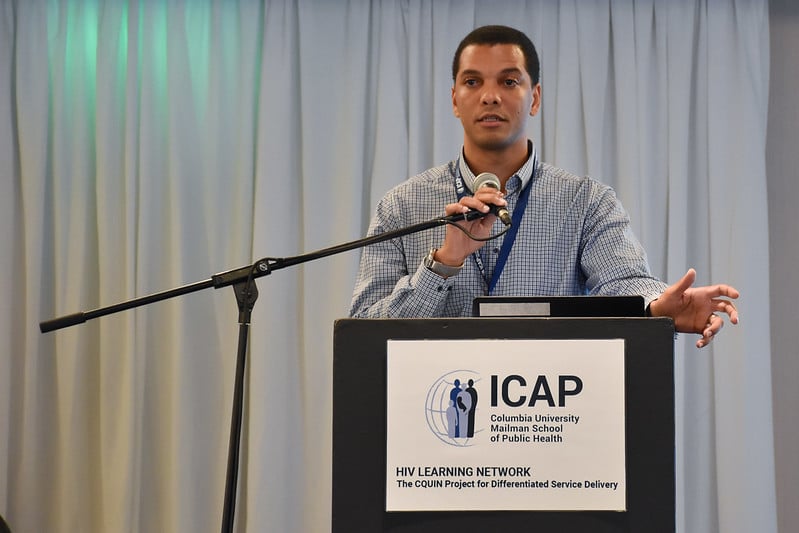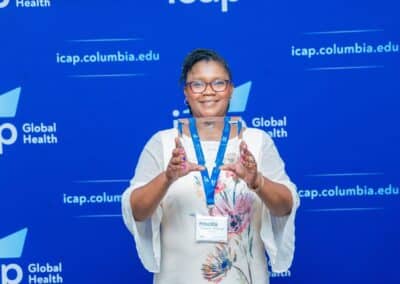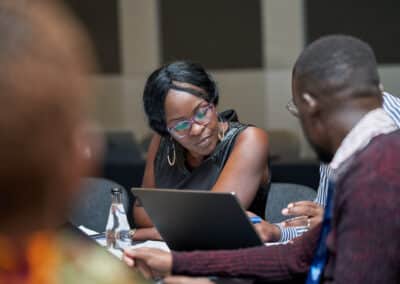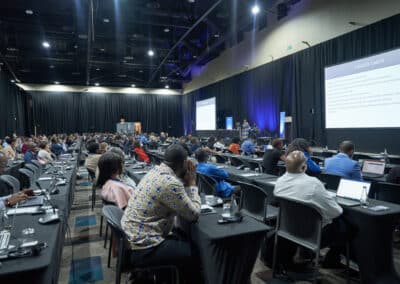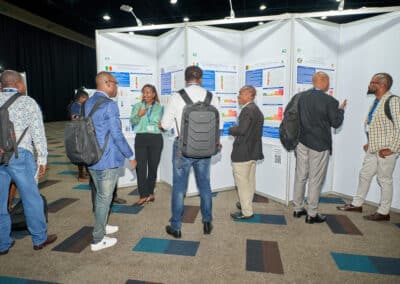Irénio Gaspar, MD, is the Head of the Care and Treatment Branch of the National STI-HIV/AIDS Program at the Ministry of Health in Mozambique. Prior to this, he worked as a clinician, interacting daily with people living with HIV, and at the Maputo City Health Directorate as the Provincial STI-HIV/AIDS Supervisor. Mozambique has been a CQUIN member since the network launched in 2017. Dr. Gaspar has participated as a representative at all of CQUIN’s annual meetings to date, and in 2018, Mozambique hosted a CQUIN workshop on the Science and Practice of Scale Up. At CQUIN’s third annual meeting on November 10-14, 2019 in Johannesburg, South Africa, Dr. Gaspar sat down to discuss Mozambique’s DSD progress, learnings from participating in three years of CQUIN activities, and plans to scale-up DSD implementation.
Q: Since you’ve been a member of CQUIN for some time now, can you share reflections from previous meetings – perhaps the Adolescents and DSD workshop, which was held in South Africa? IG: Mozambique was an early participant in CQUIN, and since joining, the country has prioritized the needs of adolescents living with HIV. For the meeting on Adolescents and DSD, we saw in Mozambique how adolescents were a priority population that was often being left behind. For example, Mozambique’s “Por Favor” model was for younger children, and the only model for adolescents were youth-friendly services (YFS), which were underutilized. As a result of the meeting and learnings from it, Mozambique developed adherence clubs just for adolescents and teens, folded within community antiretroviral groups (CAGs). As of now, adolescents are able to enroll not only in the models that have been specifically designed for them, but in others as well. Diversifying models only adds to options for priority populations, and it’s great that we can provide people with options so they can decide what works best for them.
Q: Mozambique recently onboarded a CQUIN-supported National DSD Coordinator – an individual seconded to the Ministry of Health to support DSD implementation. Can you speak toward this move and your hopes for the role? IG: In the beginning, I was not convinced that this whole DSD movement was going to be big or revolutionary. I thought of it as another project—a good one at that—but as time continued, I began to see that this was a big deal, and that Mozambique will need more people to contribute to the DSD implementation efforts if we want to enhance DSD scale-up. There was so much planning we needed to do—operations, tools creation, technical working group convenings, the development and rollout of new DSD models—I was one person working on a variety of these efforts and we knew we needed a DSD coordinator to elevate what we were already working on. Now, with the new DSD coordinator, we will be able to do all of this and more. Thus, Mozambique will be able to more quickly assess the impact of DSD, while piloting and rolling out new ideas. I look forward to seeing how this partnership will lead to the advancement of DSD.
Q: It is good to hear that you will be sharing responsibility with the new DSD Coordinator and hope to improve your efforts. One area of needed improvement that you frequently spoke about throughout this meeting is monitoring and evaluation (M&E) – can you speak more towards that? IG: M&E tends to be a blind spot for DSD in Mozambique and is certainly an area I would like to see improved by the next meeting. If M&E capability is weak, one will not know where to focus efforts and what is working well. Our tools were not able to collect all of the information we needed on DSD, so we are putting energy into developing M&E capacity. At this point, we have been growing out the M&E tools since September 2019 and though it is still in its initial phase, we estimate that by the next CQUIN annual meeting, if all goes according to plan, we will have data to present disaggregation of all the models and learn more about which particular models are performing well. We are pleased to have grown our M&E capability but recognize that it needs to be strengthened.
Q: What are your hopes for Mozambique for the next CQUIN meeting? IG: At the next CQUIN meeting we hope to present at least preliminary data on disaggregated DSD models. Our current coverage chart only shows, for example, that 41 percent of people are enrolled in DSD models and 59 percent are enrolled in the conventional model—at the next meeting we hope to break this down further. At the next meeting, we will have overseen 13 months of DSD implementation as well as a new M&E tool rollout so I’m optimistic about the level of detail our presentation will have, as well as what we can learn from those details.
Q: As this is your third CQUIN annual meeting, and Mozambique has been part of the network since its inception, you may have seen changes over the years. Can you speak toward some of the changes you have witnessed? IG: I will very obviously point out that the number of countries is growing, which is exciting because there are more experts to learn from! But there is so much more to the changes occurring. What amazes me is that every time I leave a meeting, and go back to Mozambique, we start working and define our outcomes and are generally happy about them. We then arrive at the next CQUIN meeting and present and are pleased but then countries around us say “well, we have implemented that model and gone a step further.” It makes our team realize the bar is always set higher, that there is always more to be done and we should take stock of progress but not grow complacent in our success. We must go back and always try to improve—that is the beauty of this healthy competition through CQUIN. When we are at an annual meeting, even if our DSD dashboard is in the red zone for a particular area, another country team will not say to me, “you are performing very bad, you are not doing good.” They will say, “okay you are looking at this one way, but here is another angle to approach it from.” I will always gain something from the experts that participate in these meetings, and what amazes me even if they are doing great, they will gain something from me that I am doing differently. There’s something always new to learn. With each meeting, we have able to see countries progressing some faster than others, but we are all progressing, nonetheless.
Q: Are there any meeting sessions or discussions that you have found valuable? IG: What I like more about these meetings is when we discuss the diversity of DSD models. I am a big advocate for model diversity and there are so many different models that are being implemented by the CQUIN countries.
Q: What advice would you give to the new countries joining CQUIN? IG: When you are new to this network everything amazes you. My advice would be to take in all this progress and not let it daunt you. They must not think they are far behind in DSD implementation, but take in these learnings, adapt, and perhaps take them a step further so that at the next meeting, they are teaching us. I would also say to leverage the connections from this network. As for help, we will always help you. We all have something to share and something to learn. That is why we are a part of CQUIN.


